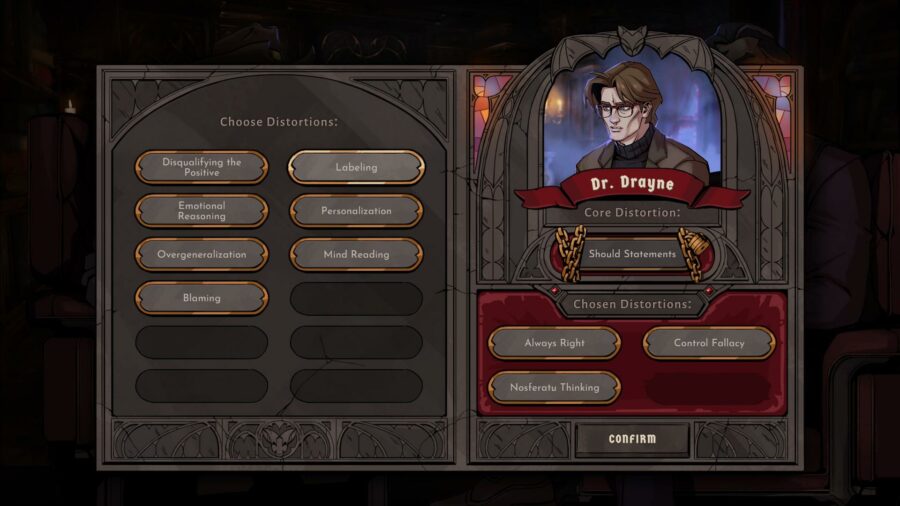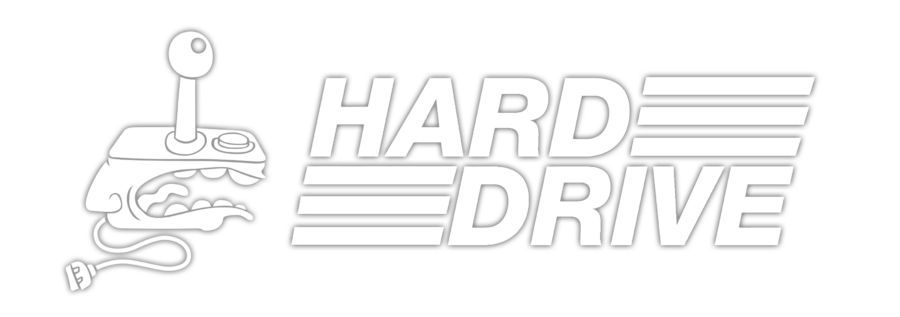I’ve grown to appreciate games with premises that, when I try to explain them to people outside the hobby, sound like I made them up on the spot.
Vampire Therapist is, against the odds, exactly what it sounds like. It is not a hilariously random title that was chosen to distinguish it from a thousand other first-person shooters, nor is it a kill phrase from The Manchurian Candidate. VT is a gently queer horror/comedy visual novel about a vampire who provides therapeutic services for other vampires.
Naturally, that means the first hurdle for anyone who’s interested in VT is their individual tolerance for visual novels. I’ve known a few people who have written off the whole genre on the basis that they aren’t really games at all. If that’s your perspective, then VT won’t change your mind. It’s a story first, an interactive psychology text second, and a game last.
Sam Walls is a former bandit and outlaw who became a vampire 200 years ago, in the last days of the Wild West. After a long stay with a sect of transcendentalists, Sam’s spent the last few decades trying to come up with new ways to think about the vampiric condition.
In the spring of 2024, Sam’s questions lead him to a nightclub in Berlin owned by the ancient vampire Andromachos. “Andy” has been asking many of the same questions as Sam for the last two millennia, and between the two of them, Sam and “Andy” begin to evolve a framework for applying modern cognitive psychology to vampires’ mental health. Subsequently, Andy has Sam take point as he calls in troubled vampires from across western Europe to talk out some of their problems.

It’s both more and less silly than that makes it sound. It’s easiest to describe VT as a black comedy, more in line with What We Do In the Shadows than Vampire: The Masquerade. Much of the game’s humor comes from Sam, as a relatively young American vampire with a Southern accent, having a profound culture clash with much older vampires from Italy, Germany, and the UK.
At the same time, VT never tries to write its characters off as anything besides monsters. One of your clients is a livestreamer who uses her audience as an inexhaustible pool of servants and victims; another is an actor who responds to criticism with murder. They’re eccentric, goofy, understandable, sometimes even charming, and also undeniably killers.
The result is a story that’s absurd right up until it isn’t. It’s a tricky balancing act, and VT just about pulls it off. It really emphasizes the “novel” part of visual novel, with some deft turns of phrase, solid voice acting, and interesting character work. This is very much in the vein (some pun intended) of something like My Dinner With Andre, where you’re primarily here to see these weirdos ricochet off of one another.
As a game, there’s a lot of Phoenix Wright in VT’s DNA. It’s a choice-based interactive story where Sam has therapy sessions with Andy or his clients, then tries to home in on the unhelpful distortions in his or others’ thinking. These distortions take the form of specific points of objection, which Sam learns about in his sessions with Andy and then tries to put into practice. That, plus the occasional simple minigame, makes up the bulk of VT’s interactivity.

VT was made by the German studio Little Bat Games, in conjunction with the mental-health charity Safe in Our World. I’d initially wondered how much of VT’s therapeutic language was accurate, and it looks like most if not all of it is.
It also explains the game’s relative lack of challenge. While you can get choices wrong during sessions in VT, there’s no real penalty for it. There also aren’t any real bonuses to getting the answers right, aside from being able to make further progress.
The overall idea behind VT seems less about testing your deductive skills and more about introducing the concept of cognitive distortions to the player, so you can be more mindful of the ways in which you treat yourself. It’s subtle, as VT is primarily presented as Sam himself learning to come to grips with the flaws in his thinking, but it gave me a lot to think about along the way.
I went into Vampire Therapist thinking that I had to check out anything with a title like that, and the first couple of hours struck me as being an earnestly written balance between absurdity, horror, and genuine psychology. The further I got into it, the more I appreciated the character interplay, but I would’ve liked some more interactivity. VT would benefit from the addition of some failure states, where it’s possible to lose clients or let Sam make some bad personal decisions.
As it is, VT feels like a teaching tool more than a novel or game. It’s thoughtful, well-written, and well-performed, with a lot to offer to anyone with an interest in horror fiction, psychology, or dark comedies. Its primary issue is that, in a genre that’s often stuck on an awkward borderline between being a game, a novel, or a vaguely interactive toy, Vampire Therapist has found a fourth thing that it can almost be.




